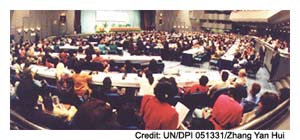Listed below are links to United Nations
components,
Major Women's NGOs and NGO Networks/Alliances
UN Components
CSW (Commission on the Status of Women) is a functional commission of the United Nations Economic and Social Council (ECOSOC), dedicated exclusively to gender equality and advancement of women. It is the principal global policy-making body. (Click here for information on how to participate in CSW meetings.)
DAW (Division for the Advancement of Women) advocates the improvement of the status of women of the world, and the achievement of their equality with men –as equal actors, partners, and beneficiaries of sustainable development, human rights, peace and security.
ECLAC (Economic Commission for Latin America and the Caribbean), headquartered in Santiago, Chile, is one of the five regional commissions of the United Nations. It was founded for the purposes of contributing to the economic development of Latin America, coordinating actions directed towards this end, and reinforcing economic relationships among the countries and with the other nations of the world.
ECOSOC (Economic and Social Council) serves as the central forum for discussing international economic and social issues, and for formulating policy recommendations addressed to Member States and the United Nations system. It is responsible for: promoting higher standards of living, full employment, and economic and social progress; identifying solutions to international economic, social and health problems; facilitating international cultural and educational cooperation; and encouraging universal respect for human rights and fundamental freedoms. It has the power to make or initiate studies and reports on these issues and to assist the preparations and organization of major international conferences in the economic and social and related fields and to facilitate a coordinated follow-up to these conferences. With its broad mandate the Council's purview extends to over 70 per cent of the human and financial resources of the entire UN system.
Office of the Special Adviser to the Secretary-General on Gender Issues and Advancement of Women (OSAGI) was created on 1 March 1997 to promote and strengthen the effective implementation of the Millennium Declaration, the Beijing Declaration and the Platform for Action of the Fourth World Conference on Women (FWCW) held in Beijing in 1995 and the Outcome Document of the special session of the General Assembly on Beijing+5
Major Women's NGO's
CONGO (Conference of Non-Governmental Organizations) in Consultative Relationship with the United Nations (CONGO) is an independent, international, non-profit membership association of non-governmental organizations (NGOs). It facilitates the participation of NGOs in United Nations debates and decision-making. CONGO is most active at the major UN centres of New York, Geneva and Vienna but its work stretches out to all regions of the world.
UNIFEM (United Nations Development Fund for Women) is the women's fund at the United Nations. It provides financial and technical assistance to innovative programs and strategies to foster women's empowerment and gender equality. Placing the advancement of women's human rights at the center of all of its efforts, UNIFEM focuses its activities on four strategic areas: (1) reducing feminized poverty, (2) ending violence against women, (3) reversing the spread of HIV/AIDS among women and girls, and (4) achieving gender equality in democratic governance in times of peace as well as war.
NGO Alliances and Networks
ECLAC (Economic Commission for Latin America and the Caribbean), headquartered in Santiago, Chile, is one of the five regional commissions of the United Nations. It was founded for the purposes of contributing to the economic development of Latin America, coordinating actions directed towards this end, and reinforcing economic relationships among the countries and with the other nations of the world.
FAFIA (Canadian Feminist Alliance for International Action) is a dynamic coalition of over 75 Canadian women’s equality-seeking and related organizations.1 FAFIA’s mandate is to further women’s equality in Canada through domestic implementation of its’ international human rights commitments.
FEMNET seeks to facilitate and coordinate the sharing of experiences, ideas, information, and strategies for human rights promotion among African women's organisations through networking, communication, capacity-building and advocacy at the regional and international levels.
FLAME is a network of African sisters online committed to strengthening the capacity of women through the use of ICTs to lobby, advocate and participate in the Beijing +5 process regionally and globally.
Global Fund for Women is an international network of women and men committed to a world of equality and social justice. We advocate for and defend women's human rights by making grants to support women's groups around the world.
WIDE is a European feminist network of women's organisations, development NGOs, gender specialists and women's rights activists. WIDE monitors and influences international economic and development policy and practice from a feminist perspective. WIDE's work is grounded on women's rights as the basis for the development of a more just and democratic world order and the search for alternative approaches to the economic mainstream.
